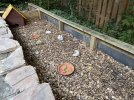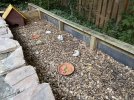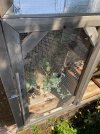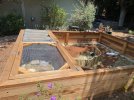Tanuki
New Member
Hello everybody! My name is Karina and I am a new tortoise owner learning the ropes. Last month we adopted a 2.5 year old Eastern Hermann’s tortoise. His name is Tanuki and he is adorable 🐢❤️. He is a healthy tortoise and his previous owner took good care of him. He lives in an outdoor enclosure in our backyard now ( please see the attached photo), but I am not sure what exactly we will do for his first winter with us. I find conflicting information about brumation. I would love to allow him to brumate naturally in an outdoor setting, but I am afraid to make a mistake. If someone has lived or is living in the state of GA or any neighboring states with similar climate, could you please help me with practical advice on how to do brumation properly? How should I modify his outdoor enclosure to allow proper brumation? Right now his outdoor enclosure has wood chips as a substrate, some rocks/shells, boston fern ( which he almost entirely destroyed by now!), terracotta plates for food and water, and a wooden house where he sleeps every night. Are there any societies or clubs for the owners of Hermann’s tortoises in GA? Do you know of any websites/apps similar to the tortoise table that have a larger database of edible plants and weeds? A lot of weeds that grow here cannot be found on the tortoise table. Do you have any suggestions about predator prevention? Right now he goes to sleep in his wooden house every night around 7:00 pm and doesn’t leave it until 9:00- 10:00 am in the morning, so I feel that he is safe and protected over there. We have squirrels, deer and, rarely, I saw opossums walking on our fence. I know it is a lot of questions in a single post, but I am new to this and any valuable info would be helpful. Thank you very much!





